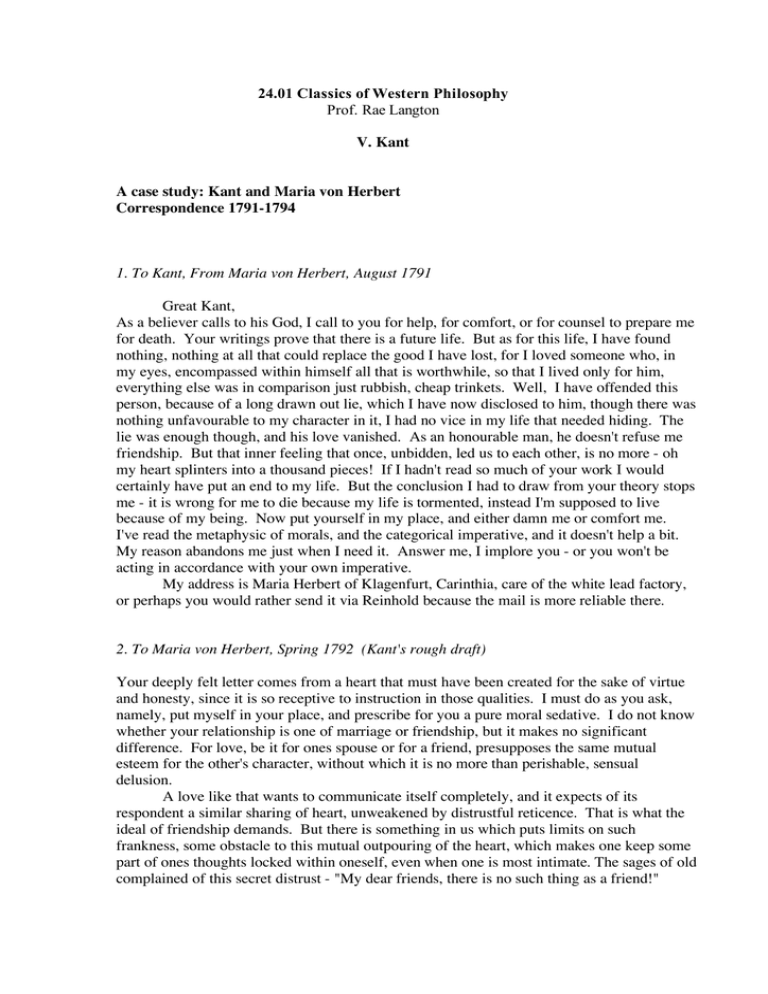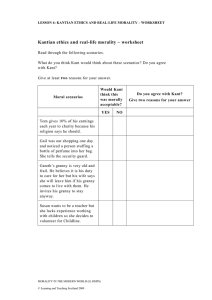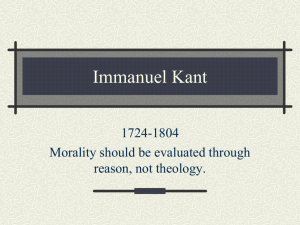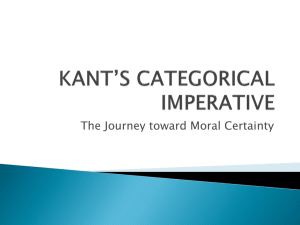24.01 Classics of Western Philosophy V. Kant Correspondence 1791-1794
advertisement

24.01 Classics of Western Philosophy Prof. Rae Langton V. Kant A case study: Kant and Maria von Herbert Correspondence 1791-1794 1. To Kant, From Maria von Herbert, August 1791 Great Kant, As a believer calls to his God, I call to you for help, for comfort, or for counsel to prepare me for death. Your writings prove that there is a future life. But as for this life, I have found nothing, nothing at all that could replace the good I have lost, for I loved someone who, in my eyes, encompassed within himself all that is worthwhile, so that I lived only for him, everything else was in comparison just rubbish, cheap trinkets. Well, I have offended this person, because of a long drawn out lie, which I have now disclosed to him, though there was nothing unfavourable to my character in it, I had no vice in my life that needed hiding. The lie was enough though, and his love vanished. As an honourable man, he doesn't refuse me friendship. But that inner feeling that once, unbidden, led us to each other, is no more - oh my heart splinters into a thousand pieces! If I hadn't read so much of your work I would certainly have put an end to my life. But the conclusion I had to draw from your theory stops me - it is wrong for me to die because my life is tormented, instead I'm supposed to live because of my being. Now put yourself in my place, and either damn me or comfort me. I've read the metaphysic of morals, and the categorical imperative, and it doesn't help a bit. My reason abandons me just when I need it. Answer me, I implore you - or you won't be acting in accordance with your own imperative. My address is Maria Herbert of Klagenfurt, Carinthia, care of the white lead factory, or perhaps you would rather send it via Reinhold because the mail is more reliable there. 2. To Maria von Herbert, Spring 1792 (Kant's rough draft) Your deeply felt letter comes from a heart that must have been created for the sake of virtue and honesty, since it is so receptive to instruction in those qualities. I must do as you ask, namely, put myself in your place, and prescribe for you a pure moral sedative. I do not know whether your relationship is one of marriage or friendship, but it makes no significant difference. For love, be it for ones spouse or for a friend, presupposes the same mutual esteem for the other's character, without which it is no more than perishable, sensual delusion. A love like that wants to communicate itself completely, and it expects of its respondent a similar sharing of heart, unweakened by distrustful reticence. That is what the ideal of friendship demands. But there is something in us which puts limits on such frankness, some obstacle to this mutual outpouring of the heart, which makes one keep some part of ones thoughts locked within oneself, even when one is most intimate. The sages of old complained of this secret distrust - "My dear friends, there is no such thing as a friend!" We can't expect frankness of people, since everyone fears that to reveal himself completely would be to make himself despised by others. But this lack of frankness, this reticence, is still very different from dishonesty. What the honest but reticent man says is true, but not the whole truth. What the dishonest man says is something he knows to be false. Such an assertion is called, in the theory of virtue, a lie. It may be harmless, but it is not on that account innocent. It is a serious violation of a duty to oneself; it subverts the dignity of humanity in our own person, and attacks the roots of our thinking. As you see, you have sought counsel from a physician who is no flatterer. I speak for your beloved and present him with arguments that justify his having wavered in his affection for you. Ask yourself whether you reproach yourself for the imprudence of confessing, or for the immorality intrinsic to the lie. If the former, then you regret having done your duty. And why? Because it has resulted in the loss of your friend's confidence. This regret is not motivated by anything moral, since it is produced by an awareness not of the act itself, but of its consequences. But if your reproach is grounded in a moral judgment of your behaviour, it would be a poor moral physician who would advise you to cast it from your mind. When your change in attitude has been revealed to your beloved, only time will be needed to quench, little by little, the traces of his justified indignation, and to transform his coldness into a more firmly grounded love. If this doesn't happen, then the earlier warmth of his affection was more physical than moral, and would have disappeared anyway - a misfortune which we often encounter in life, and when we do, must meet with composure. For the value of life, insofar as it consists of the enjoyment we get from people, is vastly overrated. Here then, my dear friend, you find the customary divisions of a sermon: instruction, penalty and comfort. Devote yourself to the first two; when they have had their effect, comfort will be found by itself. 3. To Kant, from Maria von Herbert, January 1793 Dear and revered sir, Your kindness, and your exact understanding of the human heart, encourage me to describe to you, unshrinkingly, the further progress of my soul. The lie was no cloaking of a vice, but a sin of keeping something back out of consideration for the friendship (still veiled by love) that existed then. There was a struggle, I was aware of the honesty friendship demands, and at the same time I could foresee the terribly wounding consequences. Finally I had the strength and revealed the truth to my friend, but so late - and when I told him, the stone in my heart was gone, but his love was torn away in exchange. My friend hardened in his coldness, just as you said in your letter. But then afterwards he changed towards me, and offered me again the most intimate friendship. I'm glad enough about it, for his sake - but I'm not really content, because it's just amusement, it doesn't have any point. My vision is clear now. I feel that a vast emptiness extends inside me, and all around me - so that I almost find my self to be superfluous, unnecessary. Nothing attracts me. I'm tormented by a boredom that makes life intolerable. Don't think me arrogant for saying this, but the demands of morality are too easy for me. I would eagerly do twice as much as they command. They only get their prestige from the attractiveness of sin, and it costs me almost no effort to resist that. I comfort myself with the thought that, since the practice of morality is so bound up with sensuality, it can only count for this world. I can hope that the afterlife won't be yet another life ruled by these few, easy demands of morality, another empty and vegetating life. Experience wants to take me to task for this bad temper I have against life by showing me that nearly everyone finds his life ending much too soon, everyone is so glad to be alive. So as not to be a queer exception to the rule, I shall tell you of a remote cause of my deviation, namely my chronic poor health, which dates from the time I first wrote to you. I don't study the natural sciences or the arts any more, since I don't feel that I'm genius enough to extend them; and for myself, there's no need to know them. I'm indifferent to everything that doesn't bear on the categorical imperative, and my transcendental consciousness - although I'm all done with those thoughts too. You can see, perhaps, why I only want one thing, namely to shorten this pointless life, a life which I am convinced will get neither better nor worse. If you consider that I am still young and that each day interests me only to the extent that it brings me closer to death, you can judge what a great benefactor you would be if you were to examine this question closely. I ask you, because my conception of morality is silent here, whereas it speaks decisively on all other matters. And if you cannot give me the answer I seek, I beg you to give me something that will get this intolerable emptiness out of my soul. Then I might become a useful part of nature, and, if my health permits, would make a trip to Königsberg in a few years. I want to ask permission, in advance, to visit you. You must tell me your story then, because I would like to know what kind of life your philosophy has led you to whether it never seemed to you to be worth the bother to marry, or to give your whole heart to anyone, or to reproduce your likeness. I have an engraved portrait of you by Bause, from Leipzig. I see a profound calm there, and moral depth - but not the astuteness of which the Critique of Pure Reason is proof. And I'm dissatisfied not to be able to look you right in the face. Please fulfill my wish, if it's not too inconvenient. And I need to remind you: if you do me this great favour and take the trouble to answer, please focus on specific details, not on the general points, which I understand, and already understood back when I happily studied your works at the side of my friend. You would like him, I'm sure. He is honest, goodhearted, and intelligent - and besides that, fortunate enough to fit this world. I am with deepest respect and truth, Maria Herbert. 4. To Kant, from J.B. Erhard, January 17, 1793 I can say little of Miss Herbert. She has capsized on the reef of romantic love. In order to realize an idealistic love, she gave herself to a man who misused her trust. And then, trying to achieve such love with another, she told her new lover about the previous one. That is the key to her letter. If my friend Herbert had more delicacy, I think she could still be saved. Yours, Erhard. 5. From Kant, to Elisabeth Motherby, February 11, 1793 I have numbered the letters1 which I have the honour of passing on to you, my dear mademoiselle, according to the dates I received them. The ecstatical little lady didn't think to date them. The third letter, from another source, provides an explanation of the lady's curious mental derangement. A number of expressions refer to writings of mine that she read, and are difficult to understand without an interpreter. You have been so fortunate in your upbringing that I do not need to commend these letters to you as an example of warning, to guard you against the wanderings of a sublimated 1Letters 1, 3 and 4 above. Elisabeth Motherby was the daughter of Kant's friend Robert Motherby, an English merchant in Königsberg. fantasy. But they may serve nonetheless to make your perception of that good fortune all the more lively. I am, with the greatest respect, my honoured lady's most obedient servant, I. Kant. 6. To Kant, from Maria von Herbert [early in 1794] Honoured and dearly loved man! Don't think badly of me for writing again. I had the pleasure of seeing Erhard, who said that you had asked after me, and that you received my letter at the beginning of 1793. I have received no answer. I assume you take some interest in the lives of your followers, so I will try to piece together for you the further steps I have made. I was disgusted with life for a long time, but eventually my spirit became calm. I tried to understand that wish for death, which had seemed a kind of unnatural haunting of myself, a lust after my own annihilation. And I understood in the end that, for each pure person, death is the most agreeable thing - from an egoistical point of view. It is only by keeping our friends, and keeping morality, firmly in sight that we can want life, and seek to preserve it in all circumstances. I would say much more to you, were it not for the certainty that I would be robbing you of your time. My plan is still to visit you. In the meantime I cannot think of you without the warmest feeling of thanks. Yours with a whole and full heart, Maria Herbert. [Translations abridged by Rae Langton from Immanuel Kant, Philosophical Correspondence 1759-1799, tr. and ed. Arnulf. Zweig (University of Chicago Press, 1967); Kants gesammelte Schriften, Ak. XI, Walter de Gruyter 1922. See also Immanuel Kant: Correspondence, trans and ed. A. Zweig, Cambridge edition of Kant’s works, eds. Guyer and Wood (Cambridge University Press, 1999)]







